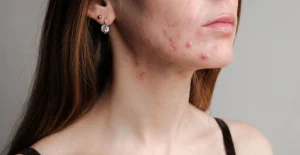Your skin might reveal more about your overall health than you realise.
While it’s often said that the eyes are the window to the soul, we think the skin deserves a closer look. As dermatology experts, we know that our skin can reflect what’s going on inside our bodies. Beyond showing signs of ageing or sun exposure, it can offer insights into our overall wellbeing.
Here are five things your skin might be telling you, and how to interpret the signs:
1. Time to Cut Down on Junk Food
A diet high in refined carbs, sugar, and unhealthy fats can lead to inflammation, which breaks down collagen and can cause premature ageing. Reducing your intake of lollies, non-organic milk, chips, and butter can help smooth out your complexion and support a healthier lifestyle overall.
2. The Weather Is Affecting Your Skin
Extreme weather conditions can have a significant impact on your skin. Cold weather strips away moisture, leading to dryness, while hot weather can cause excessive sweating, increasing the chance of breakouts. No matter the temperature, it’s crucial to use sunscreen daily. UV rays can damage your skin in winter just as much as in summer, so be diligent with sun protection year-round.
3. Your Hormones Are Imbalanced
Hormones travel through your bloodstream and can directly affect your skin. An excess of certain hormones can lead to acne outbreaks. Hormonal imbalances can be triggered by factors like diet, stress, and blood sugar levels. Balancing your diet, staying hydrated, and reducing stress are great starting points. However, since hormonal issues can sometimes indicate a deeper health concern, it’s wise to consult a dermatologist for a professional assessment.
4. You Need More Hydration
Dehydration can reduce blood flow, leading to dry and even flushed skin. When your skin feels dry or looks flushed, it might be a sign that you need more water. Before heading to a skin specialist, try drinking a glass or two of water and see if it makes a difference.
5. You’re Not Getting Enough Sleep
The connection between lack of sleep and dark circles under the eyes is real. When you’re sleep-deprived, the blood vessels under your eyes can dilate, causing dark circles. Lack of rest can also lead to fluid retention, causing puffiness around the eyes. To reduce swelling, you can place a cooled tea bag under your eyes, use a dermatologist-recommended eye cream, or simply catch up on some sleep.
Not sure what your skin is trying to tell you? A visit to a licensed dermatologist can help you decode the signs and keep your skin in top shape.


